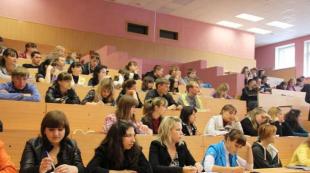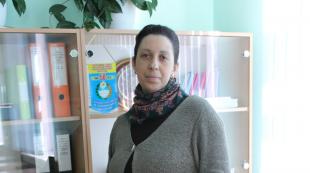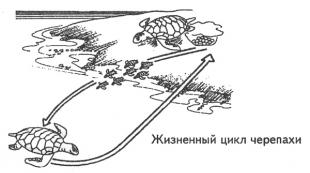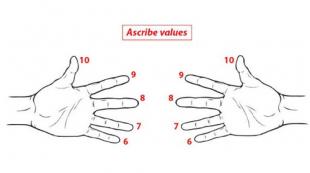Interview about the profession: primary school teacher. Interview with a teacher
I interviewed a wonderful primary school teacher - Tatyana Alexandrovna Vybornova!
- Hello, Tatyana Alexandrovna! Tell us about yourself and your profession.
I was born in 1982. Graduated from the Russian State University. Yesenin. After the second year, I got married, and a year later my girls, Lera and Vika, were born to me. I had to study in absentia for the last year. I am a mathematics teacher by education. I have been a primary school teacher for 9 years now.
- Why did you choose this profession?
Since childhood, I was accompanied by conversations about school, since my mother is also a teacher. Favorite game in childhood - "school". I had a real cool magazine that my mother brought home from work. I asked imaginary students and graded them.
- What attracts you to your profession?
I like to work with children. In my opinion, when you work with students, you get the feeling that you are not getting old at all, as it is always called in the “topic”: you know what is happening in the world, the latest news, because it is the youth that is the driving force of the country!
- What is the most difficult part of your job?
In general, I am a very hot-tempered person, I get turned on, as they say, with half a turn. Therefore, for me personally, the most difficult thing is to control myself and manage my emotions, especially in those situations when I see that the child is not only unable to learn the material, he does not want to.
Are you satisfied with your choice of this profession?
Yes, I am satisfied, because the profession of a teacher is quite interesting in terms of some new discoveries, because every time new children come and every time you have to find a common language with them, and some points of contact. I can't imagine myself in another profession.
I immediately remembered the words of Klyuchevsky: “To be a good teacher, you need to love what you teach and those you teach.” A person must first of all love children! He must also be attentive, able to correctly assess various situations and quickly find the best way out.
- What would you like to warn those who are going to get the same profession as yours?
A teacher, I think, is not even a profession, but a way of life. The teacher plays an important role in shaping the personality of each student. Becoming a teacher, you take on a huge responsibility, first of all, to the students, since the "teacher" is the foundation of all professions.
- Was it difficult to master your profession? What kind of education do you need to get for this?
No, it wasn't hard for me. In addition to education at the Russian State University, I attended various courses, because I believe that a teacher is both an educator, and a mentor, and an assistant, and a protector, and an inspirer, who is designed to help a child acquire not only knowledge about the world around him, but also to master the skills and skills.
- Do you need any special qualities for a person who has decided to become a specialist in this field?
In my opinion, no, special qualities are not needed. I believe that a teacher is still a vocation, therefore, since childhood, these people who are destined to become a teacher are responsible, punctual, hardworking, balanced, sociable.
- Does your profession bring a good income?
I never thought about this question, to be honest. For me, the most important thing is the success of my students. But, probably, when compared with the environment, teachers have a small salary. But I am ready to work miracles every day even for a small salary.
What do you think an ideal student should be? And did he meet in your practice?
In my opinion, active, inquisitive, diligent, executive, honest, diligent. Each issue has "stars" that are remembered for a lifetime. But difficult children are especially remembered, from which it is possible to mold good little men.
- What do you like to do in your free time?
I devote all my free time to my family: daughters, husband. I believe that the family is something for whom and for what a person lives. And yet, at one time I graduated from a music school. But over time, I stopped devoting time to my hobby. Now I want to resume my musical studies and have already bought a synthesizer.
- Have you ever wanted to quit everything and prove yourself in a completely different field of activity?
It happens, especially in moments of weakness and fatigue. There are such “peak” situations when you start asking yourself the question: “Why do I need all this?”. But the answer is found quickly - this is the work of your whole life, and looking for yourself in another field - I have neither reason nor thoughts for this.
- Do you have favorite students?
In my practice, I have never divided students into loved ones and unloved ones. I single out, of course, those students who begin to be interested in the subject from the very first lessons, ask additional questions, go beyond the scope of the textbook.
- Well, Tatyana Aleksandrovna, and finally, your wishes or words of gratitude to colleagues and students.
Many thanks to all those who helped me in difficult times with wise advice! Thanks to the students who helped me become wiser! “If you dream of seeing a rainbow, then don’t be afraid to get caught in the rain!” - my motto in life and at work.
- Many thanks, Tatyana Alexandrovna!
The interview was conducted by Elena Titkina, 11th grade student
So, sir. We all went to school for the first time. We all remember how we wanted or did not want to learn. We all remember how much we liked the first teacher.
When we send our child to school, we want to be sure that he will do well.
What is important to get from elementary school?
I think that for every parent (obviously, I’m not talking about shabby mothers now who are sincerely convinced of the need to stuff tons of necessary and unnecessary information into their child and force him to go to all possible additional classes, overloading him) it is IMPORTANT that in the initial school:
4. expanded their horizons
5. They didn’t discourage the desire to learn by showing that it’s interesting
6. AND MOST IMPORTANTLY: the child's inclinations and talents were not broken or beaten.
For an elementary school, it is still better to choose not a super-strong school (in the future, you can always transfer, already understanding what is more interesting for your child), but a Teacher. Those. A person who will spend a good half of the day (if not more) with your child.
And therefore, it seems to me that it is best to go to the school at the place of residence or which you have chosen, and get to know those teachers who are gaining the first grade.
Moreover, not just to get acquainted and ask standard questions that concern you, but to conduct some kind of interview. After all, roughly speaking - this person will work for you.
But we are all people and we understand that we would not like it if some aunt came and let's examine or interrogate you.
Therefore, having agreed with the teacher about the conversation, remember that you are looking for a person and are worried about your child. And when starting a conversation, first of all emphasize that you would like your child to have a good, calm, fun and interesting school. And therefore, you would like to ask a series of questions to the teacher about himself. Say that you understand that some questions will be unexpected, ask not to be surprised, because the first teacher is so important (teachers will agree with you).
I propose a list of questions.) (imagine you are conducting an interview - but not an assessment)
1. Do you like your work? Why?
2. Why did you become a teacher?
3. What do you like most about your job?
4. What is not?
5. What are you reading now? Not for work, but just for myself.
6. What do you consider the greatest achievement in your teaching practice?
7. How do you increase the interest and motivation of your students?
8. How do you feel about the fact that your students show individuality and defend their right to a personal opinion? (here attention, a good teacher understands that even kids have their own personal opinion)
9. What would you ask your students to talk about in order to get to know them better?
10. How do you deal with students who are distinguished by bad behavior and upbringing?
11. What do you want your students to remember when they leave elementary school?
12. What special methods and technologies do you use in your lessons?
13. Describe the ideal lesson, how do you envision it?
14. Have you ever had failed lessons? Tell me about the worst? (maybe at the beginning of a career, which I remember)
15. What are five adjectives that you can use to describe yourself?
16. What personal qualities do you consider the most useful in teaching?
17. Tell us about your idea of school education?
18. If you could open your own school, what would it be like?
19. What are your favorite themes in your subjects and why?
20. How do you imagine the ideal child? (again, attention! ideality is a framework that is driven into)
Once again, I remind you that you don’t need to show that you are conducting a real interview, show that you are concerned, it’s really important and interesting for you (people love it when they are interested in them), be sure to thank you for your time, for agreeing to a meeting.
And of course, immediately, by the way a person reacted to the proposal to meet, how he conducted a conversation, what he said - you will understand how interested he is in his work, loves it, loves children, what positions he has in relation to children, so what the person as a whole.
All successful conversations and excellent teachers)
Teaching is one of the most important and noble occupations on earth. It is difficult to overestimate the importance of the Teacher in the life of every person. The fate and life of students, the future of the country largely depend on the personality of the teacher and mentor, his professional and human qualities. Probably, each of us had, there is a favorite teacher in life, who not only helped to acquire knowledge, but also led to the path of life.
Our college has wonderful teachers, and we want as many people living as possible to know about them.in our city, region, our country. On the eve of the holiday, we turned to some of them with questions.
Timoshko Zhanna Iosifovna, teacher of mathematics.
I became a teacher of mathematics because I loved mathematics since childhood.
Modest, demanding, hardworking, kind, patient.
The best student should be, first of all, honest and hard-working. I don't believe in love at first sight.
What is the most original “excuse” you heard from students who were not ready for class? I have my own journal on these occasions, where I write down all the “excuses”. The most common "excuse" is "I didn't get enough sleep." Well, the original one - "I taught chemistry all night".
How many years have you devoted to college? Don't you regret? Would you like to work somewhere else besides college? I worked in college for 17 years and I don't regret it at all. If you think about it, I would also like to work in the field of medicine.
Makarevich Alla Viktorovna, teacher of Russian language and literature.
 It is said that every teacher considers his subject to be the best. Why do you love (love) the subject you teach?
He is not the best, he is needed, the main thing is that he educates a person in a person. The most pleasant thing is that I see brilliance, interest in what is being discussed, lively emotions, a response to what students hear and learn, it's nice when they thank for the lesson.
It is said that every teacher considers his subject to be the best. Why do you love (love) the subject you teach?
He is not the best, he is needed, the main thing is that he educates a person in a person. The most pleasant thing is that I see brilliance, interest in what is being discussed, lively emotions, a response to what students hear and learn, it's nice when they thank for the lesson.
I like it, not an unfounded opinion, but a lively interest, but this is connected with the personality of the student.
What is the most original “excuse” you heard from students who were not ready for class? I don’t remember the most original one, but the most frequent ones: I had a headache or forgot. Everyone has health problems right before the lesson of Russian literature/language.
your life credo . Be the best in everything.
Burak Olga Viktorovna, teacher of special disciplines.
 How do you feel about the fact that your students show individuality and defend their right to a personal opinion?
I feel good about the fact that the student defends his opinion, it is not interesting when there is no opinion.
How do you feel about the fact that your students show individuality and defend their right to a personal opinion?
I feel good about the fact that the student defends his opinion, it is not interesting when there is no opinion.
Name three to five adjectives that you can use to describe yourself. Purposeful, competent, serious.
Have you ever had failed lessons? Any teacher always has failed lessons.
The working day of the teacher is busy: training sessions, checking the work of students, meetings with parents, meetings, teachers' councils and much more. What is the best way to relieve stress after a hard day at work? At the end of a working day, nothing is more relaxing than a good cup of coffee. And also music, music always plays in my house, no matter what I do.
Tatyana Yurchik, foreign language teacher, translator.
 All the guys, and this is not a secret, strive to be the best, but not everyone succeeds. Who is the best student? How to define it? Give a verbal portrait of such a young man or girl.
First of all, a good student works hard, and not just sits out a couple, tries to learn what he was interested in in his spare time, respects the teachers and the guys in the group.
All the guys, and this is not a secret, strive to be the best, but not everyone succeeds. Who is the best student? How to define it? Give a verbal portrait of such a young man or girl.
First of all, a good student works hard, and not just sits out a couple, tries to learn what he was interested in in his spare time, respects the teachers and the guys in the group.
Which of your students do you remember better than others? Why? The question is provocative, there is no one that would stand out alone, but I want to draw attention to the entire current 4th year.
Do you regret working in college? I don't regret being in college. When you work with students, then to some extent you know yourself, you yourself remain young.
your life credo . To keep up with the times.
Ivanchik Valentina Anatolyevna, head of the department of educational work, teacher of mathematics.
Please tell us how you got into the profession? At school, all subjects were equally easy for me, but I singled out mathematics and literature. Judging that everything in literature is easy and understandable, I chose mathematics.
Name three to five adjectives that you can use to describe yourself. Sociable, talkative, cautious, kind, quick-tempered, quick-witted.
Have you ever had failed lessons? Tell me about the worst. Were. I felt very bad, but I had to explain a new complex topic. Confused. I apologized. Started all over. I believe that those who do not work are not mistaken.
How many years have you devoted to college? Don't you regret? Would you like to work somewhere else besides college? I have been working in college for 15 years, I do not regret it. I wouldn't work anywhere else, because there are always new sensations and a lot of work, work is always great! And with our students I always feel almost the same age as them.
your life credo . Always for!
Ilyukhin Valery Nikolaevich, teacher of pre-conscription training

All the guys, and this is not a secret, strive to be the best, but not everyone succeeds. Who is the best student? How to define it? Give a verbal portrait of such a young man or girl.
The best is most often determined by skill, knowledge and desire. You can't, but you want to.
What are three to five adjectives that you can use to describe yourself? The adjective is a board to the door, because it is attached. I can't rate myself. My assessment is the performance of my students.
What is the most original "excuse" you heard from your students? Delayed!
What is your life credo? My credo is respect for the family.
A student of group 117-PS Kamashinsky Alexander and a student of group 113-BT Streykish Yulia communicated with teachers of the college.
Interviews are one of the most rewarding types of content.
You select questions, send them to the hero, get answers, format them and print! Of course, this is a superficial scheme for creating an interview. In fact, this is an independent and bright content format. And in the blog, it looks very advantageous against the background of the usual articles, guides and news.
We have already prepared several materials on the topic of the interview. Now we will talk about the most important stage of preparing for an interview - the questions.
Studying the hero, I want to ask him important and sharp questions at the same time. I want the interview to not be boring, banal and typical. I want the reader to swallow it, savoring every letter, every line.
And at such moments, at hand there is a lack of a selection of interview questions that can be adapted to an individual character.
Interview Questions: 60 Templates
- Tell us about yourself, your business.
- How can you describe yourself in two words?
- When did you decide to become _____ and why?
- What brought you exactly to __________?
- What inspired you to _________?
- What were the first steps?
- What are the pros and cons of working _______?
- Describe your biggest achievement and most impressive failure?
- Describe three of your accomplishments?
- Are there moments when inspiration leaves you (lose faith in yourself, in your business)?
- Describe your work environment?
- Do you plan to change _______?
- What are your plans in _______?
- What is the secret to success in _____?
- How did you succeed in _______?
- What are your favorite books (movies, meals)?
- What would you never do in your life?
- Can it be said that ______?
- On what basis do you ______?
- Did you come to this position yourself or ______?
- How have you changed since _______?
- Do you love your job (business, product, service, business)?
- What do you like to do in your free time?
- How to make ________?
- What advice can you give to newcomers (employees, readers)?
- When did you last _________?
- What interests you besides ______ and ________?
- How do you take a break from ____?
- How did you come up with the idea to organize ________?
- Did you do _____ on your own or with support?
- How often you ________?
- What do you think _______ is?
- What qualities do you think _____ should have?
- Are you being yourself while doing your job, or is it a PR move?
- What is the share of luck and luck in your project?
- Do you have your own motto, mission?
- You have already achieved a lot in your profession, has popularity changed you?
- How much time do you devote to ______?
- Why do you think such a point of view has been formed in society (in the market, in a company, on forums, on the Internet)?
- What was the most difficult for you?
- Tell me step by step what needs to be done to _________?
- Where to start a newbie if he wants to follow in your footsteps?
- What professional advice can you give to those who are just starting to develop in _______?
- What are the pitfalls in your field?
- Is it difficult to do what brings you money? What does it cost you?
- How did you get your first success?
- How do others perceive your development (work, changes)?
- Where are you looking for your customers (customers, buyers, investors, partners)?
- There is no desire to throw everything to the "damn grandmother" and start something completely new?
- Tell me the TOP 5 most effective tactics (tips, tricks, tricks, secrets, ways) in _______?
- What is your opinion on this question: ___________?
- Form your attitude to life (business, family, colleagues, employees) in five words?
- What is the main expertise of a person of your level?
- Was it difficult to give up _______ (free time, stability, career growth)?
- Are you always this open (closed, aggressive, optimistic, quick)?
- How would you rate yourself as _______?
- Have you ever crossed your principles in your professional activity?
- In any case, there are turning points. What were yours?
- What prevents you from living, and what helps?
- What are you dreaming about?
Of course, these questions are more related to personal rather than professional interviews. But in any case, each of them can lead to a chain of new ideas, which eventually turn into a full-fledged conversation script.
Andrey, good afternoon, tell us what are you doing now?
I am a teacher of computer science at a rural school number 29. It is located in the Moscow region, in the Mytishchi district, in the village of Belyaninovo.
I have been working in this school for 8 years and I don't want to leave anywhere. Thanks to the team that we have formed, thanks to the director, who gathered such people around him and keeps them. I am very grateful to fate for bringing me together with the director of this school.
Andrey, what do your parents do?
Dad works as a physical education teacher, although he taught geography, biology, chemistry. Mom is a math teacher. She is now a school principal.
Have you wanted to be a teacher since childhood?
At first I wanted to become an athlete, especially since I had the opportunity to play basketball professionally. At a more conscious age, I was always fascinated by architecture, physics, computer science and mathematics - these 4 areas attracted me very strongly from school. And when it was necessary to decide on higher education, with good scores in the certificate and with a large selection of universities, I still chose pedagogical, because I always had an example of my parents before my eyes.
I am very grateful to God for this, because at the Pedagogical University that I chose, I also met my future wife. We sat at the same desk, graduated from the same faculty, one course together. She is also a teacher of mathematics and computer science.
Where exactly did you study?
Moscow State Regional University, Faculty of Physics and Mathematics, Department of Physics and Informatics. By the way, my brother also graduated from it, now he is a teacher.
Wow, you have a very interesting dynasty.
Yes, and grandmothers were also teachers on both sides.
What did grandmothers teach?
My paternal grandmother was a history teacher at the institute. According to her mother, she worked as a kindergarten teacher. I, it turns out, is already teaching in the third generation.
How is the teacher's day?
We get up in the morning. I take my wife to work. I also go to work.
Classes start at 8:30. Classes go, children come. It's all interesting, because every time the topics are different, the children are different. This flow of people that passes through you helps to keep yourself in good shape.

After completing the lessons, I decide the rest of the affairs at school. The public has such an opinion that after the lessons the teacher closes the office and goes home to rest. In fact, nothing of the kind - work is constantly going on. Over the past few years, it has become possible to devote more time to educational developments, your ideas, working out the next lesson - sometimes you need to correct or redo the presentation, or additionally work on the project with the children. Then the end of the working day around 18-00, and often later. I pick up my wife from work, we go home or meet with friends, we try to get out to Moscow more often - to an exhibition, to a museum.
I also periodically participate in field events - I share my experience, show teachers in other regions various options for teaching lessons - someone is interested in cloud technologies, someone does not know how to establish interaction with a 3D printer, someone is interested in developing 3D models - I have already visited the Yaroslavl and Penza regions, in Yakutia, in the Khabarovsk Territory.

Why do you like being a teacher so much?
I like the feeling that with my work I bring some benefit to society. You see, a student comes to class. He did not know something in this world. And he leaves with this knowledge. These 45 minutes, which are allotted for this action, for a lesson, are put aside in the formation of thinking and education of a person. Therefore, this area attracts. You understand that you bring a certain direct benefit to society. You don’t sort through papers with numbers that are expressed in the amount of goods sold or bought (I don’t want to offend anyone). The benefit that this profession brings to society cannot be measured, but every teacher feels it. Therefore, once entering the class, with a high probability, he will not leave from there. This is a profession that requires constant attention to oneself, to others, to absolutely everything and everyone. First of all, this is attention to the child, to the student. Because now what we do is our future. We are creating, in fact, a society that will possibly rule the country in 20-30 years. And now, how much education we invest in our children, such consequences await us in the coming decades.
What qualities do you need to possess to engage in such an important craft?
In my opinion, a person must first of all be a professional in his field, his discipline. He must have deep knowledge himself, absolutely not at a superficial level.
The ability to transfer this knowledge is also important. Many are quite educated, savvy in certain issues, but there is absolutely no desire to transfer existing knowledge.
And the third is a great love for children. After all, we teach not just a set of people, machines that clearly record everything and, in an ideal situation, understand everything at once. We must be aware that there are 25 people in the lesson, and each needs an individual approach. Some write slowly, some write fast. Some perceive faster, others slower. It is this totality that gives the contingent of the class with which the teacher works every lesson. It does not happen that the teacher turns on some kind of sound recording or video film and leaves. There must be an understanding of what you are doing. Everyone needs their own approach.
Andrei, do you feel that the attitude of parents towards teachers has somehow changed?
I heard completely different opinions in the media, different options and cases. Maybe I was lucky, but in my practice I come across only very significant examples of a good friendly attitude on the part of parents towards teachers. Perhaps this is the common merit of the entire team. They find a common language with everyone, and everyone works not for themselves, but for common goals. The ability to create a situation where parents understand that the teacher, and he, and everyone in general are working to ensure that the child receives an education.
It seems to me that this is very important and relevant in our time. Because very often parents have a position that the child was taken to school, and what he does there is of little concern to them. They believe that once he goes to school, he should be taught absolutely everything there, but they themselves do not put any effort into this. A child came from school, goes about his business, and okay. The school does it all. Actually, this is wrong. Children, especially at a younger age, need to be engaged constantly. We are talking about both teachers and parents - this should be done, including at home. Do not let go and say that you study at school, and we will stand aside and look at the results. You have to be part of the process.
In my practice, there are simply no such examples. Always very correct, very good and the parents communicate, very often make contact, and the teachers are not against it.
You say that the teachers are together, that you have a very good team, a team - but how do you communicate, share experiences?
Naturally, there is a pedagogical council, there are methodological associations. If we are talking about some joint ideas - for example, a geography or biology teacher and I come up with some interesting project.
What kind of projects do you create, can you give an example?
The last time we did a project dedicated to the creation of a smart home using microcontrollers. This is when a person comes home, the light automatically turns on there, the heat turns on. When it is not, all this is turned off so that the energy consumption is more optimal. Automatic watering.
The guys program in pairs what they can assemble with their own hands, like robots. Not those robots that walk with legs, arms or wheels, but devices that respond to a specific command, due to external sensors. Created such a project - it turned out well. It was interesting.
Which project are you most proud of?
You know, I am proud of all my students and all the projects that I did ( note: Andrey has a huge number of different projects - he uploads many on his website: agsidenko.ru). But I can give an example - I like the project on studying weather phenomena in dynamics. You can calculate what kind of weather we will have in 10 years, how many cars in the city will be with a certain increase, how much CO2 will be released.
The guys also make architectural solutions for the city. This is a 3D modeling program. They create such special objects and try to think of what the school would look like if it was in some kind of gothic style. Or a baroque office. Maybe they are building a university of the future or a House of Culture for someone. We do things like this every day.

One of the works of Andrey's students - the layout was created by Orendarchuk Artem

Is a teacher's salary enough to live on?
If a person comes into this profession solely for the sake of a salary, then this, as a rule, is not for long. It is unlikely that this is a teacher. Maybe everything will be fine for a year. Anyway, there must be a set of qualities in a person, among other things. If someone reads me from the very powers that be, of course, I would like a higher salary. But this is true in any profession.
Andrew, how do you like to relax?
I love vacationing with my wife. When it comes to summer, we love to travel together. We travel quite a lot. And so on ordinary days we like to walk. Museums, cinemas, theaters.

You can go to the river to feed the ducks. In winter, go skiing.
Russian classics - Pushkin, Tolstoy. From the specifics - "Eugene Onegin", "War and Peace", "Anna Karenina", "Master and Margarita". This is something that I have already read several times.
I read a lot - we have a fairly large library. I don't focus on anything in particular.
Andrey, what do you think is the best way to look for a life's work for those who have not yet found it?
Perhaps the best way is not to stand still. You need to travel, be interested, communicate, walk, visit museums, meet some interesting people. Now there are so many opportunities to attend all kinds of lectures - so many interesting people come to Russia!

Sometimes a few offers or some events can turn your life around! I remember how I began to show children projects with architectural solutions, and one boy got very carried away and later he entered the Moscow Architectural Institute. I do not feel that it is directly my merit that he entered there. But that's how he learned about this industry and realized that it's all interesting enough that you can create a variety of designs. Everything can happen quite by accident, in the most unexpected place. Nothing will happen only in one case - if a person will stand still and do nothing.









